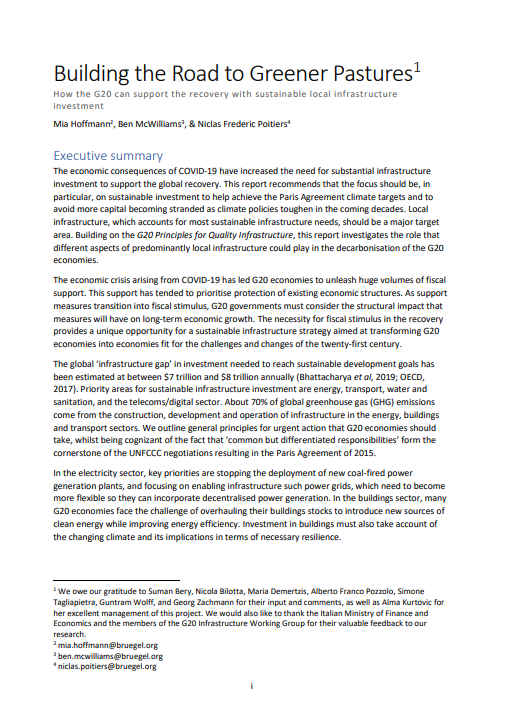External Publication
Building the Road to Greener Pastures
How the G20 can support the recovery with sustainable local infrastructure investment.
We owe our gratitude to Suman Bery, Nicola Bilotta, Maria Demertzis, Alberto Franco Pozzolo, Simone Tagliapietra, Guntram Wolff, and Georg Zachmann for their input and comments, as well as Alma Kurtovic for her excellent management of this project. We would also like to thank the Italian Ministry of Finance and Economics and the members of the G20 Infrastructure Working Group for their valuable feedback to our research.
The economic consequences of COVID-19 have increased the need for substantial infrastructure investment to support the global recovery. This report recommends that the focus should be, in particular, on sustainable investment to help achieve the Paris Agreement climate targets and to avoid more capital becoming stranded as climate policies toughen in the coming decades. Local infrastructure, which accounts for most sustainable infrastructure needs, should be a major target area. Building on the G20 Principles for Quality Infrastructure, this report investigates the role those different aspects of predominantly local infrastructure could play in the decarbonisation of the G20 economies.
The economic crisis arising from COVID-19 has led G20 economies to unleash huge volumes of fiscal support. This support has tended to prioritise protection of existing economic structures. As support measures transition into fiscal stimulus, G20 governments must consider the structural impact that measures will have on long-term economic growth. The necessity for fiscal stimulus in the recovery provides a unique opportunity for a sustainable infrastructure strategy aimed at transforming G20 economies into economies fit for the challenges and changes of the twenty-first century.
The global ‘infrastructure gap’ in investment needed to reach sustainable development goals has been estimated at between $7 trillion and $8 trillion annually (Bhattacharya et al, 2019; OECD, 2017). Priority areas for sustainable infrastructure investment are energy, transport, water and sanitation, and the telecoms/digital sector. About 70% of global greenhouse gas (GHG) emissions come from the construction, development and operation of infrastructure in the energy, buildings and transport sectors. We outline general principles for urgent action that G20 economies should take, whilst being cognizant of the fact that ‘common but differentiated responsibilities’ form the cornerstone of the UNFCCC negotiations resulting in the Paris Agreement of 2015.
In the electricity sector, key priorities are stopping the deployment of new coal-fired power generation plants, and focusing on enabling infrastructure such power grids, which need to become more flexible so they can incorporate decentralised power generation. In the buildings sector, many G20 economies face the challenge of overhauling their buildings stocks to introduce new sources of clean energy while improving energy efficiency. Investment in buildings must also take account of the changing climate and its implications in terms of necessary resilience.
In mobility, a shift away from of the current model of polluting private vehicles is required to decarbonise the sector. Infrastructure deployment should focus on clean charging stations, improved public transport networks, and walking and cycling routes. Increasingly, access to high-speed internet and the deployment of other digital infrastructure is necessary for sustained economic growth. Efforts are still required to improve the disposal and recycling of solid waste and wastewater, both of which contribute to greenhouse gas emissions and to local pollution.
Discussions about sustainable infrastructure normally focus on the end-use. This report instead advocates a lifecycle approach to assessing the sustainability of infrastructure. This must begin by addressing the significant GHG emissions associated with basic construction materials. A number of difficulties associated with decarbonising the production of steel, aluminium and cement make it imperative that the G20 should collaborate to support low-carbon options.
To close the multi-trillion dollar investment gap, new sources of financing must be found. Public investment can provide some of the required infrastructure, but crowding-in of private funds will be crucial to achieve sufficiently high levels of infrastructure investment. The current financial market, with a combination of excess savings and low interest rates, presents an ideal opportunity for doing so.
However, a number of barriers continue to block these flows, particularly to local projects. Local governments find it difficult to access private finance, while private investors often struggle to invest because of a lack of infrastructure opportunities of sufficient size and quality. A final obstacle to private investment is the high risk associated with local infrastructure projects. Infrastructure projects are generally long-term, entailing substantial and costly planning, preparation and construction, while cost overruns and delays are pervasive.
National and international development banks do and must continue to play a critical role in tackling these issues. Development banks are in an ideal position to assess the risks of projects, and simultaneously implement best management practices. Their involvement in a project can reduce the cost of financing for the borrower, in particular when the public sector is ready to assume the greatest funding risk. That would make projects more attractive for private investors.
National governments can play a central role in crowding-in private sector investment by ensuring a supportive and enabling investment environment. This involves addressing macroeconomic barriers and project-specific elements, such as the risk of construction delays, cost overruns and project non-completion.
Establishing a sustainable and local infrastructure strategy is not without challenges, but offers significant economic benefits. A coordinated effort by G20 economies to pursue the approaches outlined in this report, building on previous G20 commitments, can underpin sustainable economic strategies for successful economic recovery in the wake of COVID-19. The report closes with some recommendations to the G20:
- Place climate sustainability at the core of the infrastructure agenda;
- Sustainability plans must start locally;
- Improve access to finance for low-carbon projects;
- Address the shortage of bankable infrastructure projects;
- Commit to supporting bilateral and multilateral development banks;
- Stimulate demand for low-carbon industrial materials;
- Improve cooperation across the G20;
- Focus on lifecycle infrastructure sustainability.
This paper was prepared for the a meeting of G20 Finance Ministers and Central Bank Governors (FMCBG) on 9 and 10 July 2021.









